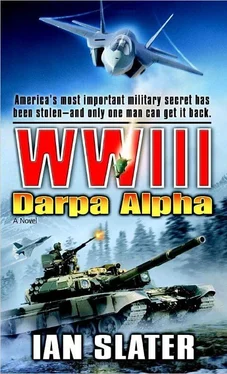“I need to see her,” said the general.
“Well, first,” the sheriff told him, “you’ll need to talk to Grierson, the local M.D. He’s a tough nut. Says we can’t talk to her for days, maybe weeks, even.”
“Choir,” Freeman told the Welsh-born American. “Take Prince over to where the paratrooper bikes were abandoned after the raid. Should be good scent there.” He suddenly turned back to the sheriff. “You didn’t let anyone near the bikes, did you?”
“No, sir. Yellow-taped the area and I’ve had a deputy there since.”
“Good man.” Freeman entertained the possibility of the terrorists backpacking out. Next, he called Johnny Lee over. “Sheriff says there’s a patient, Roberta Juarez—” Freeman paused and looked back at the sheriff. “—I take it she’s Spanish-American, or is that her husband’s—”
“She’s Mexican.”
“Right,” said Freeman, and turned to Lee. “You come with me, Johnny. We’re going for another helo ride. Quick trip up to Sandpoint. Ten minutes and we’ll be there. Let’s go.” As he strode toward the chopper, he told Aussie Lewis, Salvini, Gomez, Eddie Mervyn, and Tony Ruth to take a break while Choir and Prince were checking out the abandoned mountain bikes that had so successfully been used as props in the terrorists’ attack.
Freeman and Lee moved quickly away from the chopper’s downdraft and the exhaust fumes that were polluting the pristine mountain air into the thick antiseptic air of Sandpoint Hospital, their Vibram boots squeaking sharply on the polished linoleum floor.
Through the glass of the intensive care unit, Freeman could see thirty-three-year-old Roberta Juarez lying in a bed, her head in a shroud of bandages. Only her left eye, her lips, and nostrils were visible, giving her an unfortunately ghoulish appearance, an impression reinforced by the fact that her badly bruised right arm was attached to an intravenous drip. It was obvious to Freeman, from his side on view of her neck, that Roberta’s hair had been shorn off in the trauma unit. Her left hand was in a cast, the doctor explained, because when she’d been shot, her left hand and arm must have taken the brunt of the fall.
“She conscious?” asked Freeman.
“In and out,” replied the young, casually dressed doctor, who, except for his stethoscope, could have passed for a golfer about to go practice his putting. Through the window at the end of the corridor, Freeman glimpsed a menacingly overcast sky. He flexed his wrist and glanced at his watch so that the young doctor would get the message that there was no time to lose. If it started to rain, it would wash away the marauders’ scent. There were other ways, of course, to track them — broken twigs and brush — but the best would be for Prince to get the scent from the abandoned bikes and go from there. Since Freeman’s call to Eleanor Prenty, the word had gone out to the Department of Homeland Security, FBI, and the Bureau of Land Management in northern Idaho to give “all assistance possible to General Freeman’s team.”
“Doctor, I need to speak with Ms. Juarez as soon as possible. Find out if she can tell us anything that might—”
“No way,” said the athletic-looking doctor, planting himself imperiously in front of the door. “This patient is in critical condition and I—”
“Johnny,” the general told his SpecFor translator. “Give me a strip.”
Lee whipped out a plastic cuff strip from one of his battle dress uniform’s many pockets.
“What the hell—” began the doctor, his face flushed with shock and anger. “Nurse!”
Freeman’s face was an inch from the young physician’s. “Listen, Grierson, I’m on the trail of terrorists who murdered — I say again, murdered —ten Americans because they wanted something that’s so classified that I don’t even know what it is yet. But I do know one thing, and that is that Roberta Juarez is probably the only person still alive who saw the killers. Anything, anything she can tell me could be vital not only to my finding those sons of bitches but to the security of the United States. Now step aside or I’ll arrest you under the Patriot Act, Section 11B—‘directly or indirectly giving aid and comfort to the enemy.’”
“This is outrageous!” said Grierson. “I’m not moving. Nurse! ”
Freeman felled him with one blow.
“Cuff him, Johnny!”
The general stepped over the physician, who was gasping for air like a landed fish, and opened the door to Intensive Care. Roberta was moving her head slightly from side to side, moaning. Perhaps the kerfuffle, the general thought, with young Dr. Grierson had brought her around or had disturbed her somnolence sufficiently that she might hear him. He identified himself gently but firmly, not knowing whether she was hearing him. Had she seen anything that might help them identify the killers?
No answer. No response at all.
He pressed the question respectfully but insistently. “The men who attacked you, Ms. Juarez?” Freeman could hear the doctor swearing. Johnny Lee had him cuffed to a hallway chair and told him that if he didn’t want to be thumped again he’d better be quiet. A nurse saw them, advanced, stopped, then turned and ran back to her station to call security.
All Roberta could say, her voice cracked and dry, was, “It’s spotted.” Her dark eyes closed; she seemed to be asleep. Freeman stayed for a moment, gently taking her warm, flaccid wrist, and prayed for her and, if it be God’s will, help to catch those who had perpetrated the massacre.
When he emerged from the IC unit, security, a short, overweight woman, perspiring heavily, was warning Johnny Lee that she’d called the sheriff.
“You can come with us, ma’am,” Johnny Lee told her as the general emerged from the ICU. “We’ll take you to him.”
Lee uncuffed the doctor, who was now vigorously massaging his wrists. “You’re fucking fascists!” the doctor shouted at both men. The security woman was standing by, openmouthed.
“Get anything?” Johnny asked the general on their way out.
“It’s spotted,” Freeman told him. “That’s all she said.”
“One of the terrorists’ faces maybe,” Johnny ventured, “spotted with psoriasis?”
“Hmm — it’s possible.”
“You — fucking fascists!”
When they returned from the far end of the lake below Bayview to the DARPA base, the sheriff had mustered the day staff together: seven scientists and their seven technicians who worked on the DARPA “Flow-In-Flight” project. He was told that there were more scientific personnel involved in ARD — Acoustic Research Development — as it related to submarines, but the people Freeman was interested in were those who had been working on the latest deep-water-moored DARPA ALPHA barge and the hut where the terrorists had shot the night staff. They had been added to the Acoustic Research Development complex here only in the years since 2007, when more research money had been freed for homeland-defense-associated projects. The money became a flood following the terrorist attacks in which shoulder-fired anti-aircraft rockets had brought down three American aircraft since 9/11.
“Sorry for your loss,” Douglas Freeman told the visibly shaken chief scientist, a Professor Richard Moffat, head of the fourteen-person day shift. “But I need to know precisely what these scumbags stole.”
“A disk,” said Moffat, a man around Freeman’s age.
Though most of the day staff were dressed casually in jeans, like the doctor at the hospital, here in the open they were all wearing either heavy sweaters or Gore-Tex Windbreakers, the temperature having plummeted in the confluency of the Pacific Ocean front that had come barreling in from the northwest, slamming into a warmer Chinook wind driving northward into the Alberta badlands. It was getting cold. Moffat was the only one wearing a white lab coat, stained, it seemed to Freeman, with rust and grease, probably from working near the gantry and cranes of a second green-and-white-striped DARPA ALPHA barge where the staff had to haul in new large-scale test units from the deep, glacier-carved lake.
Читать дальше












